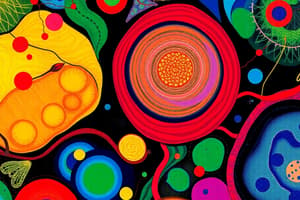Podcast
Questions and Answers
What is the study of organisms and their interactions with the environment called?
What is the study of organisms and their interactions with the environment called?
- Genetics
- Microbiology
- Zoology
- Ecology (correct)
Which branch of biology is primarily concerned with the classification and study of plants?
Which branch of biology is primarily concerned with the classification and study of plants?
- Microbiology
- Zoology
- Ecology
- Botany (correct)
What aspect of biology explains that all living organisms are made up of cells?
What aspect of biology explains that all living organisms are made up of cells?
- Metabolism
- Homeostasis
- Cell Theory (correct)
- Evolution
Which level of biological organization is characterized by groups of similar cells performing a common function?
Which level of biological organization is characterized by groups of similar cells performing a common function?
Which concept in biology refers to the genetic information contained within an organism?
Which concept in biology refers to the genetic information contained within an organism?
What term describes the ability of an organism to maintain a stable internal environment regardless of external changes?
What term describes the ability of an organism to maintain a stable internal environment regardless of external changes?
Which level of biological organization includes groups of individuals of the same species in a specific area?
Which level of biological organization includes groups of individuals of the same species in a specific area?
Which branch of biology studies microorganisms like bacteria and viruses?
Which branch of biology studies microorganisms like bacteria and viruses?
Flashcards are hidden until you start studying
Study Notes
Overview of Biology
- Definition: Biology is the scientific study of life and living organisms, encompassing their structure, function, growth, evolution, distribution, and taxonomy.
Branches of Biology
-
Zoology
- Study of animals and their behavior, physiology, and classification.
-
Botany
- Study of plants, including their physiology, structure, genetics, and ecology.
-
Microbiology
- Study of microorganisms, including bacteria, viruses, fungi, and protozoa.
-
Ecology
- Study of interactions between organisms and their environment.
-
Genetics
- Study of heredity and variation in organisms.
-
Evolutionary Biology
- Study of the origins and changes in the diversity of life over time.
Key Concepts in Biology
-
Cell Theory
- All living organisms are composed of cells; the cell is the basic unit of life; all cells arise from pre-existing cells.
-
Homeostasis
- The ability of an organism to maintain a stable internal environment despite external changes.
-
Metabolism
- All chemical processes that occur within a living organism to maintain life, including catabolism and anabolism.
-
DNA and Genetics
- DNA (deoxyribonucleic acid) carries genetic information; genes are segments of DNA that code for proteins.
-
Evolution
- Change in the heritable traits of biological populations over successive generations, driven by natural selection and mutation.
-
Ecological Relationships
- Interactions such as predation, competition, symbiosis, and mutualism among organisms.
Levels of Biological Organization
-
Molecular Level: Atoms and molecules, including biomolecules like proteins, lipids, carbohydrates, and nucleic acids.
-
Cellular Level: Cells, the basic unit of life, classified into prokaryotic (no nucleus) and eukaryotic (with nucleus).
-
Tissue Level: Groups of similar cells performing a common function.
-
Organ Level: Structures composed of different tissues working together.
-
Organ System Level: Groups of organs that perform complex functions.
-
Organism Level: Individual living entities.
-
Population Level: Groups of individuals of the same species living in a certain area.
-
Community Level: Different populations interacting in a specific area.
-
Ecosystem Level: Communities interacting with their environment (abiotic factors).
-
Biosphere Level: The global sum of all ecosystems, the zone of life on Earth.
Scientific Method in Biology
- Observation: Gathering information through senses.
- Hypothesis: Formulating a testable explanation for observations.
- Experimentation: Testing the hypothesis through controlled experiments.
- Analysis: Interpreting data to determine if it supports or refutes the hypothesis.
- Conclusion: Drawing conclusions and communicating results.
Importance of Biology
- Healthcare: Understanding diseases and developing treatments.
- Environmental Conservation: Protecting biodiversity and ecosystems.
- Agriculture: Enhancing food production through understanding plant and animal biology.
- Biotechnology: Utilizing biological systems for industrial and medical applications.
Overview of Biology
- Biology studies life, focusing on various aspects like structure, function, growth, evolution, and classification of living organisms.
Branches of Biology
- Zoology: Examines animals, including behavior, physiology, and classification.
- Botany: Investigates plants' physiology, structure, genetics, and ecological roles.
- Microbiology: Analyzes microorganisms like bacteria, viruses, fungi, and protozoa.
- Ecology: Studies how organisms interact with each other and their environments.
- Genetics: Explores heredity, genetic variation, and the role of genes.
- Evolutionary Biology: Focuses on the origins and changes in the diversity of life over time.
Key Concepts in Biology
- Cell Theory: Asserts all living organisms consist of cells; cells are fundamental to life and arise from existing cells.
- Homeostasis: The capacity of an organism to maintain a stable internal state despite external environmental changes.
- Metabolism: Encompasses all chemical processes for sustaining life, including catabolic and anabolic reactions.
- DNA and Genetics: DNA holds genetic information; genes are DNA segments that encode proteins.
- Evolution: Involves changes in heritable traits within populations over generations influenced by natural selection and mutations.
- Ecological Relationships: Comprises interactions like predation, competition, symbiosis, and mutualism among various organisms.
Levels of Biological Organization
- Molecular Level: Includes atoms and biomolecules like proteins, lipids, carbohydrates, and nucleic acids.
- Cellular Level: Involves cells, which can be prokaryotic (lacking a nucleus) or eukaryotic (with a nucleus).
- Tissue Level: Consists of groups of similar cells working together for a specific function.
- Organ Level: Refers to structures made of different tissues performing particular roles.
- Organ System Level: Encompasses groups of organs that collaborate for complex functions.
- Organism Level: Represents individual living entities.
- Population Level: Comprises groups of the same species in a specified area.
- Community Level: Involves different populations interacting in a given environment.
- Ecosystem Level: Relates to communities interacting with both biotic and abiotic environmental factors.
- Biosphere Level: Constitutes the global sum of all ecosystems, representing the Earth’s life zone.
Scientific Method in Biology
- Observation: Involves collecting information via sensory input.
- Hypothesis: Developing a testable explanation based on observations.
- Experimentation: Conducting controlled experiments to test the hypothesis.
- Analysis: Interpreting results to assess support or contradiction of the hypothesis.
- Conclusion: Summarizing findings and disseminating results.
Importance of Biology
- Healthcare: Crucial for understanding diseases and formulating treatments.
- Environmental Conservation: Essential for protecting biodiversity and ecological systems.
- Agriculture: Informs food production improvements through insights into plant and animal biology.
- Biotechnology: Applies biological systems for advancements in industrial and healthcare applications.
Studying That Suits You
Use AI to generate personalized quizzes and flashcards to suit your learning preferences.




